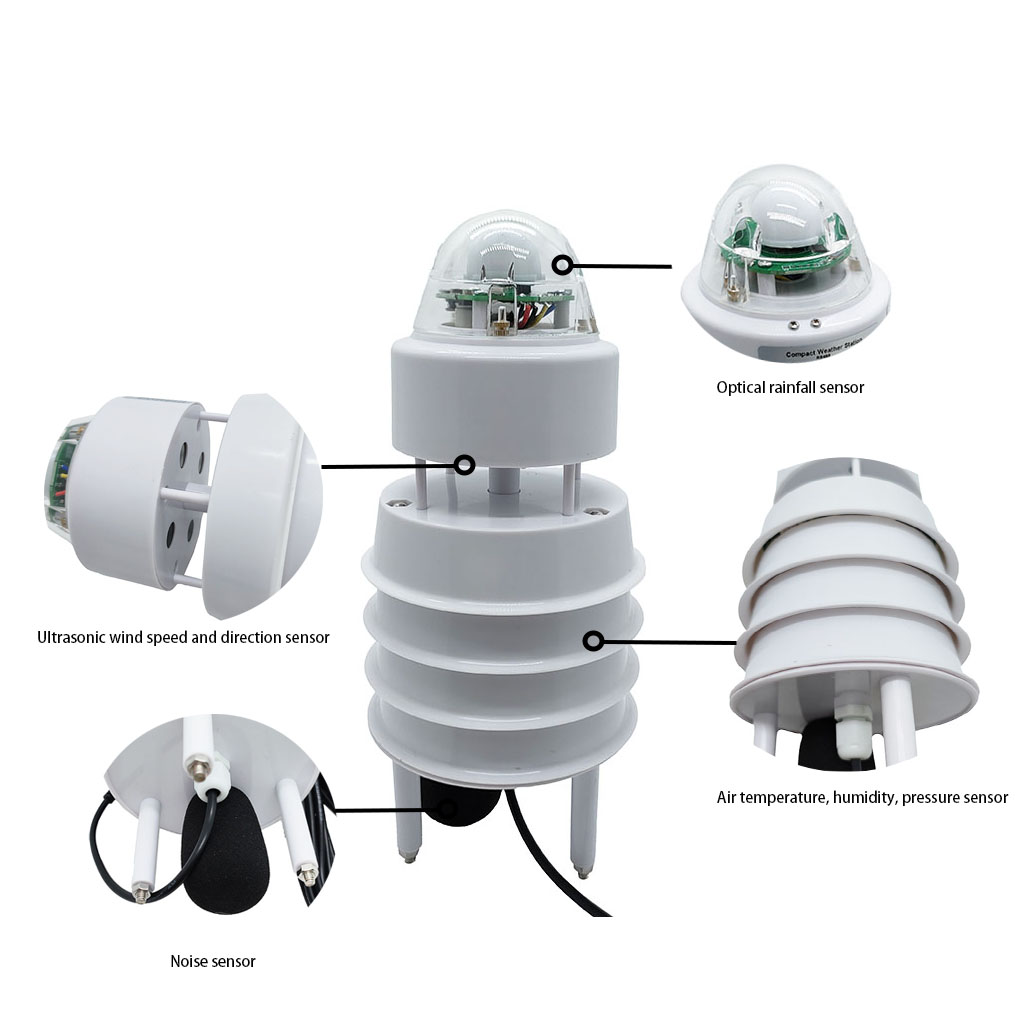Mefutafuta ya maemo a lehodimo a Afrika Borwa e etsa hore e be sebaka sa bohlokwa bakeng sa tlhahiso ya temo le tshireletso ya tikoloho. Ha ho tobanwe le phetoho ya maemo a lehodimo, maemo a lehodimo a feteletseng le diphephetso tsa taolo ya mehlodi, tlhahisoleseding e nepahetseng ya maemo a lehodimo e se e le ya bohlokwa haholo. Dilemong tsa morao tjena, Afrika Borwa e kgothaleditse ka mafolofolo ho kenngwa ha diteishene tsa maemo a lehodimo tse iketsang ho ntlafatsa bokgoni ba yona ba ho beha leihlo maemo a lehodimo. Diteishene tsena tsa maemo a lehodimo tse iketsang ha di kgone feela ho bokella tlhahisoleseding ya maemo a lehodimo ka nako ya sebele, empa hape di fa balemi, bafuputsi le baetsi ba melao tlhahisoleseding e nepahetseng ya maemo a lehodimo ho thusa ntshetsopele ya temo le ho ikamahanya le maemo a lehodimo.
Liteishene tsa boemo ba leholimo tse iketsang ke sesebelisoa se felletseng sa ho lekola boemo ba leholimo se ka lekanyang le ho rekota mefuta e fapaneng ea liparamente tsa boemo ba leholimo tse kang mocheso, mongobo, pula, lebelo la moea, tataiso ea moea le khatello ea moea. Ha ho bapisoa le litebello tsa setso tsa letsoho, melemo ea liteishene tsa boemo ba leholimo tse iketsang e bonahala haholo-holo likarolong tse latelang:
Pokello ea lintlha tsa nako ea sebele: Liteishene tsa boemo ba leholimo tse iketsang li ka bokella le ho fetisa lintlha lihora tse 24 ka letsatsi, li fa basebelisi tlhahisoleseling ea boemo ba leholimo e nepahetseng le e nakong.
Ho nepahala le ho tsitsa ho hoholo: Ka thuso ea theknoloji ea sejoale-joale, ho nepahala ha tekanyo ea liteishene tsa boemo ba leholimo tse iketsang ho hoholo, 'me ho tsitsa le ho tšepahala ha data le hona ho ntlafalitsoe.
Ho fokotseha ha ts'ebetso ea batho: Ts'ebetso ea liteishene tsa boemo ba leholimo tse iketsang e fokotsa tlhoko ea ts'ebetso ea batho le monyetla oa liphoso tsa batho, 'me e ka boela ea etsa tlhokomelo ea boemo ba leholimo libakeng tse hole.
Ho kopanngoa ha mesebetsi e mengata: Liteishene tsa boemo ba leholimo tse iketsang tsa sejoale-joale hangata li kopanya mesebetsi e kang polokelo ea data, phetiso ea waelese le tlhokomelo e hole, e leng se etsang hore tsamaiso ea data ea boemo ba leholimo e sebetse hantle haholoanyane.
Morero oa seteishene sa boemo ba leholimo se iketsang Afrika Boroa o qalile ka tšebelisano-'moho pakeng tsa mmuso le mekhatlo ea boemo ba leholimo. Tšebeletso ea Boemo ba Leholimo ea Afrika Boroa, hammoho le mafapha a amehang a kang Lefapha la Temo le Lefapha la Tikoloho le Meru, e ikemiselitse ho kenya liteishene tsa boemo ba leholimo ho pholletsa le naha. Ho fihlela joale, ho fihletsoe liphetho tse kholo masimong a mangata a kang tlhahiso ea temo, lipatlisiso tsa mahlale a boemo ba leholimo le temoso ea likoluoa.
Khothaletsa tlhahiso ea temo: Tlhahisong ea temo, tlhahisoleseling ea boemo ba leholimo e nakong e ka thusa balemi ho ntlafatsa liqeto tsa temo. Mohlala, likhakanyo tsa pula tse fanoang ke liteishene tsa boemo ba leholimo li ka thusa balemi ho hlophisa nosetso ka tsela e utloahalang le ho ntlafatsa ts'ebetso ea mehloli ea metsi.
Tšehetsa ho ikamahanya le maemo a leholimo: Lintlha tse fanoeng ke liteishene tsa boemo ba leholimo li ka sebelisoa bakeng sa tlhahlobo ea tšusumetso ea phetoho ea maemo a leholimo, ho thusa mebuso le sechaba ho nka mehato e sebetsang haholoanyane ea thibelo ha ho sebetsanoa le liketsahalo tse mpe tsa boemo ba leholimo.
Patlisiso ea saense le thuto: Lintlha tse tsoang liteisheneng tsa boemo ba leholimo ha li thuse temo ka kotloloho feela, empa hape li fana ka lintlha tsa motheo bakeng sa lipatlisiso tsa saense ea boemo ba leholimo, 'me li khothalletsa kutloisiso le lipatlisiso tsa saense ea boemo ba leholimo har'a barutehi le baithuti.
Leha projeke ea seteishene sa boemo ba leholimo se iketsang Afrika Boroa e fihletse liphetho tse itseng, e ntse e tobane le liphephetso tse ling nakong ea ts'ebetsong. Mohlala, meralo ea motheo libakeng tse ling tse hole ha e ea phethahala, 'me botsitso ba phetiso ea data le libaka tsa polokelo bo ntse bo hloka ho ntlafatsoa. Ho phaella moo, tlhokomelo ea lisebelisoa le koetliso ea basebelisi le tsona ke lintlha tsa bohlokoa.
Nakong e tlang, Afrika Borwa e tla tswela pele ho atolosa marangrang a diteishene tsa boemo ba lehodimo tse iketsang, e kopanya theknoloji ya sathelaete le Inthanete ya Dintho (IoT) ho ntlafatsa ho nepahala le ho fumaneha ha data. Ka nako e ts'oanang, ho matlafatsa kutlwisiso le tshebediso ya setjhaba ya data ya boemo ba lehodimo ho tla e thusa ho bapala karolo e kgolo tlhahisong ya temo le ho arabela phetohong ya maemo a lehodimo.
Ho kenngwa ha diteishene tsa boemo ba lehodimo tse iketsang Afrika Borwa ke mokgwa wa bohlokwa wa ho arabela phetohong ya maemo a lehodimo le ho ntlafatsa bokgoni ba tlhahiso ya temo. Morero ona o tshehetsa diqeto tsa tlhahiso tsa balemi, taolo ya dikoduwa tsa mmuso, le ntshetsopele ya dipatlisiso tsa mahlale ka ho ntlafatsa ho nepahala le ho ba nakong ha data ya boemo ba lehodimo. Ka kgatelopele ya theknoloji le ho teba ha tshebediso, diteishene tsa boemo ba lehodimo tse iketsang di tla bapala karolo ya bohlokwa ho netefatseng tshireletso ya dijo ya naha le ntshetsopele e tsitsitseng ya tikoloho.
Bakeng sa tlhahisoleseding e batsi ka seteishene sa boemo ba leholimo,
ka kopo ikopanye le Honde Technology Co., LTD.
Email: info@hondetech.com
Webosaete ea k'hamphani:www.hondetechco.com
Nako ea poso: Pulungoana-27-2024


